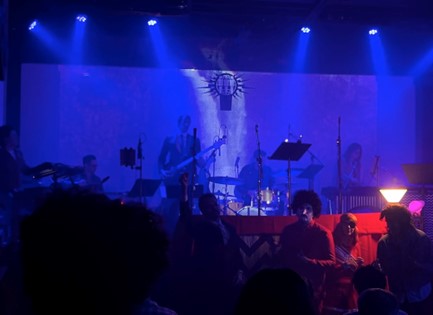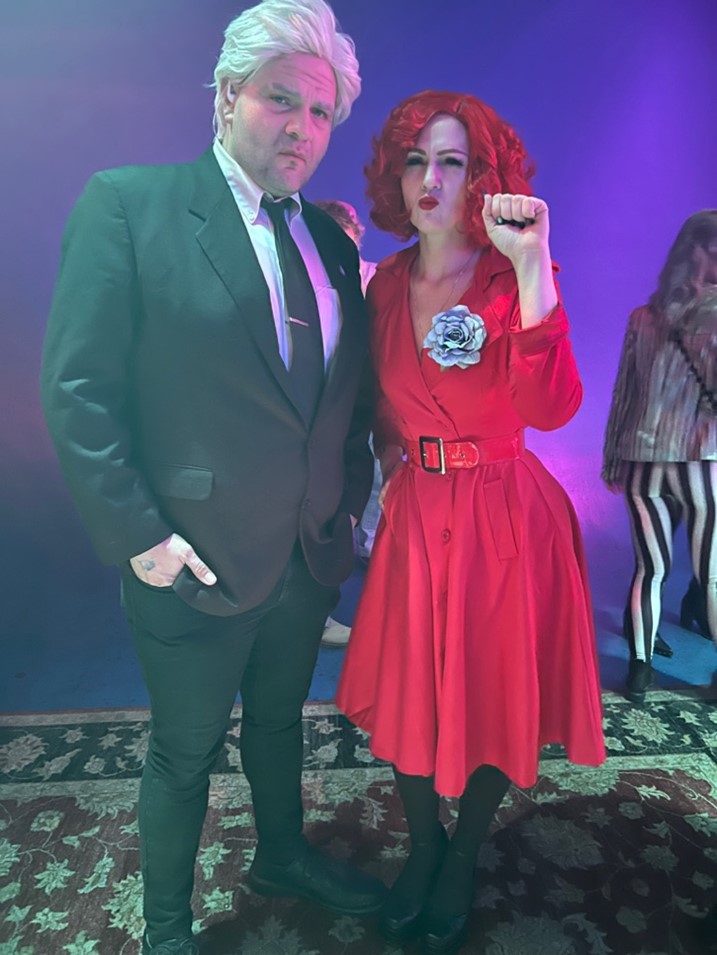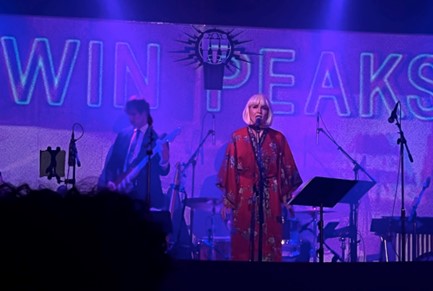In the Blue Room...
White Lodge: An Evening with Music of Twin Peaks
It’s hard to believe that the original television series Twin Peaks (1990–1991) was aired and canceled a year later, over thirty years ago. However, the White Lodge: Evening with Music of Twin Peaks event held at the Blue Room at Third Man Records on October 28, 2023, provided an immersive and nostalgic experience for fans of the series in Nashville. This “pre-Halloween” party, complete with Twin Peaks cosplay, was highlighted with a live performance of the soundtracks for Twin Peaks (the TV series) and the 1992 prequel feature film Twin Peaks: Fire Walk With Me.

Singer, songwriter, instrumentalist, and visual artist Thayer Sarrano was the evening’s organizer and host. Sarrano assembled a band consisting of Nashville local musicians, many of whom she plays and tours with regularly. Angelo Badalamenti—who passed away almost one year ago (December 11, 2022)—composed Twin Peak’s music in close collaboration with program’s creator David Lynch, and additionally, Lynch contributed many of the lyrics to the songs written throughout the franchise. I asked Sarrano what had prompted her to want to organize a Twin Peaks musical show and whether she and bandmembers felt a connection to the series. Her response:
“Everybody in the band is a fan of the show and the music of Angelo and David world. I originally thought it would be fun to have an excuse to play vibes [vibraphone] and thought it would be cool for around Halloween. It kind of morphed into something bigger in its production as ideas came in for how to make it more into a show. Then, with Angelo passing away, it seemed like a good idea to do it again [Sarrano and company first presented this show in 2022].”
The bandmembers’ names are: Matty Algers (drums), Alec Newnam (bass/bass vi), Wade Cofer (guitar), Paul Thacker (saxophone), Micah Hulscher (synthesizers), and Thayer Sarrano (vibraphone, Rhodes piano, and piano).
Nashville’s The Blue Room, located at the headquarters for Third Man Records—that’s Jack White’s, of the White Stripes, Third Man Records—between The Gulch and Pie Town neighborhoods, is an intimate live-music performance space that also holds films screenings, poetry readings, and art shows. The venue’s already dreamy aesthetic; complete with its retro interior architectural features, its iconic elephant’s head, and its thorough dispersion of cool blue light; provided the perfect backdrop for such an event. When entering, it was like stepping into Twin Peaks’s Bang Bang Bar, or otherwise known as simply the Roadhouse to the town’s locals. The Blue Room’s stage was fixed with projected images from the series—such the varied thrush perched on a pine branch at the beginning of every Twin Peaks episode, the Packard Sawmill, or other aspects of the titular town’s rustic beauty—behind a thick wash of red and blue stage lighting. Event guests enjoyed engaging in cosplay donned in clothing indicative of their chosen characters, which included several of those of the main cast like the murdered Laura Palmer, her best friend Donna Hayward, F.B.I. Special Agent Dale Cooper, Audrey and Ben Horne, waitress Shelly Johnson, and more. Especially clever were those who came as some of the more obscure characters such as the Log Lady, an unlikely oracle who conduits otherworldly messages through a log she carries; Heidi, the lesser-known Double R waitress who anxiously and oddly giggles; Aunt Nadine, complete with eyepatch; or Lil, Gordon Cole’s “moth

er’s sister’s girl,” who wears matching neon pink hair—uncommon in the early 1990s—dress, and shoes.
Much of the music for the evening was inspired by scenes in the Roadhouse, which featured actress and singer Julee Cruise—who sadly passed away only a few months before Badalamenti on June 9, 2022—lip-synching to songs from two of her albums, Floating into the Night (1989) and The Voice of Love (1992). Selected songs from both albums written by Badalamenti and Lynch were included in the scores for the original television series and Fire Walk With Me and reprised in Twin Peaks’s 2017 third season, The Return. Important to the mystique of the Twin Peaks universe is the linkage between the Roadhouse singer played by Cruise, the songs she sings, and space in which she sings them, and as a Twin Peaks superfan myself, this is where I give Sarrano and all performers major props.
A quick Twin Peaks lesson for readers unfamiliar with the franchise: Lynch’s brainchild, also with writer Mark Frost, the first season and a half of the series centered on the question, “Who killed Laura Palmer (Sheryl Lee)?” F.B.I. Special Agent Dale Cooper (Kyle MacLauchlan) comes to Twin Peaks and leads the murder investigation. While trying to find Laura’s killer, Cooper unearths a myriad of secrets about the town, involving its denizens and otherworldly forces that lurk within the sprawling forest along the town’s borders. This otherworldly realm includes the White Lodge—the home of spirits who oversee man and nature—and the Roadhouse seems to serve as an extension of this same supernatural province, evidenced by key scenes in the program. Likewise, Cruise performs in the Roadhouse wearing a mid-century styled prom dress complete with a platinum blond bouffant hairdo, a powdered white face, and striking red lipstick—for Lynch fans, Cruise’s character could perhaps be a reimagination of Eraserhead’s (1975) The Lady in the Radiator. Since Twin Peaks’s setting is 1989, Cruise’s anachronistic appearance in the show is noticeably out of place, pointing towards the uncanny.

Music is an integral component of Roadhouse scenes. Consistent with Cruise’s 1960s-“Classic”-pop-princess looks, her songs clearly contain elements of that era that indicate doo-wop and torch ballads about unrequited love. However, these songs that resemble “Classic” pop are met with a sonic quality inspired by 1980s indie-alternative music, or dreampop. Using a collection of digital and analog synthesizers, the score of Twin Peaks is immersed in a thick haze of heavy reverberation. This admixture of sonic qualities joins the notion of an often-perceived naïveté from the past with an otherworldly swath of dreampop, which, like Cruise’s appearance, evokes the surreal and uncanny. There is an indescribable yet immense beauty within this liminal space between the real and surreal that Cruise’s performances elicit, and this same aesthetic was successfully achieved by Sarrano, her band, and by all of the evening’s guest vocalists.
“Into the Night,” beautifully performed by Jessie Baylin, sonically appeared in Twin Peaks’s fifth episode when Agent Cooper and Twin Peaks law enforcement stumbled upon Cruise’s voice crooning from a vinyl record player from inside Jacques Renault’s (Walter Olkewicz) cabin in the woods. Baylin successfully captured the song’s mysterious and haunting tone. I loved Lola Kirk’s performance of “Rockin’ Back Inside My Heart,” where Cruise lip-synched to her own recording in episode seven during a pivotal scene in the Roadhouse. The innocent lyrics, “Tell your heart that I’m the one. Tell your heart it’s me,” are juxtaposed with others that are more threatening, “Tell your heart, you make me cry. Tell your heart, don’t let me die;” that juxtaposition is set against a light, “doo-woppy” feel. Kirk maintained the kitschy bent of her performance even through the more haunting and tragic aspects of the song’s lyrics.
Caroline Spence’s performance of “The World Spins” was divine. The pacing of “The World Spins” is slow, and the beautiful and sweet quality of Spence’s voice provides the perfect energy to navigate through the languid song. Appearing in the same scene of the show as “Rockin’ Back,” “The World Spins” is wildly conflicting since Cruise performs it in the scene at the same time Maddie—Laura’s look-alike cousin—is being murdered in the Palmer residence. It is especially uncanny since “The World Spins” resembles Skeeter Davis’s “The End of the World” (1962) in that both songs share similar arpeggiated ostinato patterns that seem to signify the motion of the world spinning. Both songs embody that mid-century naïveté in their sounds, but their lyrics suggest a high-stakes view of teen love; their titles and lyrics use “the world” as a reference. “The World Spins” and “The End of the World” use the point of view of a jilted lover, expressing how the world continues to spin despite their love lost. These three singers mentioned above really helped capture a specific ethos of Twin Peaks. Like how Badalamenti and Lynch’s songs sound simultaneously innocent and haunting, yet they embody a crucial essence of the show. Despite Twin Peaks’s nostalgic first impressions, in part through its score, it is only revealed that the nostalgia presented merely attempts to serve as a veil to hide the show’s trauma. When the realities contained within Twin Peaks’s narrative—about corruption, sexual violence, and brutal murder—eventually show through that veil, that nostalgia is exposed only to be a hollow illusion.

There were other stunning performances, including: “Just You,” sung by Justin Collins; “The Nightingale,” sung by Courtney Marie Andrews; “Sycamore Trees,” sung by Natalie Prass; and a standout performance of “Falling,” sung by Kim Collins. There were several fun incidental numbers, including some “Leland songs,” or a collection of random songs Leland Palmer (Ray Wise)—who is Laura’s Killer, presumably under the guise of the demon spirit BOB (Frank Silva)—sings as he appears to lose his grip with reality. “Mairsy Dotes” and “Getting to Know You” were performed by Sean Jennings. Scott Collins sang Leland-song, “Get Happy,” but Collins’s “A Real Indication” performance was a standout moment of the night. To me, Collins delivered the tune with an intriguing Zappa-esque quality. “A Real Indication” is one of the “trippier” songs in Fire Walk With Me that sonically frames one of the more surreal moments with Laura and Bobby Briggs (Dana Ashbrook) in front of Twin Peaks High School, just before Laura discovers the pages missing from her diary. One of my favorite songs from the franchise, “Questions in a World of Blue,” from the Roadhouse scene in Fire Walk With Me, was sung as a chorale by Caroline Spence, Natalie Prass, Thayer Sarrano, Wade Cofer, Matty Algers, and Sean Jennings.
The evening’s performance also included much of the non-diegetic score for Twin Peaks, including the “Main Title” with its iconic “warbly” bass sound that harkens back to the sounds of “Outlaw” country artists like Merle Haggard and Johnny Cash. Twin Peaks’s “Main Title,” which began every episode and continued franchise installment, is an instrumental version of “Falling.” Also, “Laura Palmer’s Theme” covered much of the sonic landscape in the series. Its three main sections—like its brooding C-minor pedal point, optimistic-sounding melodic ascent, and glorious main theme that shortly descends back to the starting C minor section—together are like an aural depiction of Laura’s persona audiences learn about throughout the series. Bobby’s description of Laura to Dr. Jacoby (Russ Tamblyn) fits this music the best: “And every time she [Laura] tried to make the world a better place, something terrible came up inside her and pulled her back down into Hell[…]” Also, Sarrano and company played many of the “cool” jazz tracks from the show’s more film-noir moments, like “Freshly Squeezed/Dance of the Dream Man,” “Audrey’s Dance,” and “Bookhouse Boys.” Another standout moment was how Paul Thacker’s saxophone playing captured Badalamenti’s darker and murkier jazz tracks from Fire Walk With Me. Sarrano and company created such wonderful and immersive experience for us all.
From what I could gather, I and all the guests thoroughly enjoyed our time at the White Lodge: Evening with Music from Twin Peaks; The Blue Room was still packed at the show’s conclusion. On the way out, we were all treated to cherry pie and some—excuse me, wait a minute—damn fine coffee! Whether a reprise of this event will occur during the next Halloween season is yet to be determined, but I have my fingers crossed. If you run across an advertisement for the event at some point, I strongly urge you to go. It was fun and artistically satisfying for both Twin Peaks fans and friends of fans.



